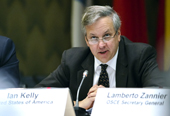
US ambassador recommends to protect critical voices
By Gvantsa Gabekhadze
Tuesday, March 7
“The Government needs to protect critical voices,” the U.S. Ambassador to Georgia, Ian Kelly, stated at a conference in Tbilisi, allegedly referring to the Rustavi 2 private broadcaster’s court trials.
The ambassador recalled the time he served as the spokesperson of the US Department of State and dealt with the media on a daily basis.
“It was intense because the relationship between the government and press, especially between the spokesmen and press can only be described as adversarial relationships. But I also very much respected the journalists who came to the briefings every day at the department, forced me to be as honest and open as possible.
“I really gained the appreciation of the importance of the media for keeping government accountable and keeping democracy which means governing according to the will of the people, keeping democracy strong and vibrant. And I think that there is no object of government that’s more important than protecting liberty and there is no institution that’s more important in keeping fundamental freedoms alive and vibrant and the independent media,” Kelly said.
Kelly stated Georgia is a model for defending democratic values in the region.
“I think Georgia keeps moving forward in developing this democracy while other countries in this region are moving backwards. This is why the United States has such a stake in the success of democracy, because Georgia is the virtue as model for governance in this region and when we do speak out as we spoke out last week is because we want Georgia to succeed,” he said.
The constitution provides freedom of speech and the press, and citizens generally are free to exercise these rights, although there were allegations the government at times did not adequately protect them, reads the 2016 Human Rights Report by US Department of State.
“Journalists, NGOs, and the international community raised concerns about the environment for media pluralism following developments affecting the independence of the country’s leading television broadcasters, including its leading station, Rustavi 2. Parliament’s failure to select all eight members of the reconfigured board of the Georgian Public Broadcaster for a third consecutive year amplified concerns about the politicization of the selection process and its negative impact on the ability of state-funded television and radio outlets to fulfill their programming responsibilities,’ the statement reads.
Meanwhile, Rustavi 2's lawyers plan to send all the required additional documents for extending the suspension mechanism to Strasbourg Court in a while.
The European Court of Human Rights temporarily suspended the enforcement of Georgia’s Supreme Court’s solution, which granted the shares of the media outlet Rustavi 2 to its former owners until March 8.


